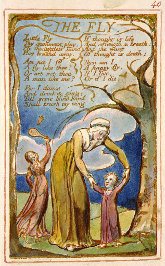Songs of Innocence and Experience Contents
- Social / political context
- Religious / philosophical context
- Literary context
- Textual history
- Songs of Innocence
- Introduction (I)
- The Shepherd
- The Ecchoing Green
- The Lamb
- The little black boy
- The Blossom
- The chimney sweeper (I)
- The little boy lost (I)
- The Little Boy Found
- Laughing song
- A Cradle Song
- The Divine Image
- Holy Thursday (I)
- Night
- Spring
- Nurse's Song (I)
- Infant Joy
- A Dream
- On Another's Sorrow
- Songs of Experience
- Introduction (E)
- Earth's Answer
- The Clod and the Pebble
- Holy Thursday (E)
- The Little Girl Lost
- The Little Girl Found
- The Chimney Sweeper (E)
- Nurse's Song (E)
- The Sick Rose
- The Fly
- The Angel
- The Tyger
- My Pretty Rose-tree
- Ah! Sun-flower
- The Lilly
- The Garden of Love
- The Little Vagabond
- London
- The Human Abstract
- Infant Sorrow
- A Poison Tree
- A Little Boy Lost (E)
- A Little Girl Lost
- To Tirzah
- The Schoolboy
- The Voice of the Ancient Bard
- A Divine Image
The Fly - Synopsis and commentary
 Synopsis of The Fly
Synopsis of The Fly
The speaker speculates on whether s/he is or is not like the Fly which is carelessly swept away by the speaker's hand. The Fly may have little, if any, conscious awareness of itself and its mortality. If the speaker shares that freedom from awareness, then life or death is of little consequence.
Commentary
This poem is in some respects a companion to The Lamb in Songs of Innocence and has links with A Dream and On Another's Sorrow in that sequence:
- In The Fly, the question is whether human life is of any more value than that of a passing fly
- In the earlier poems, human and animal / insect life is seen as of infinite value to its creator.
The speaker's sentiments can also be seen as an exercise in false logic. The equation between fly and man only holds up if the different premises are valid:
- Is human life constituted only by the ability to dance, drink and sing?
- Does the absence of thought equate to death?
Blake exposes the way in which reason can be employed to deny the full realities of human life.
Beyond this, however, lies the equation between the speaker's ‘thoughtless hand' in stanza one and the ‘blind hand' in stanza three. The speaker sees him/herself as being as totally insignificant to, and as totally subject to, some blind force in the world, as the fly is to him. He isn't simply reacting to the fly and drawing a message from it. He is approaching the fly with an existing presupposition about the nature of things. The speaker is a contrast with the speaker in The Lamb in which the likeness of the lamb and the child lies in their common relationship to a creator.
Investigating The Fly
- Do you find the logic here persuasive?
